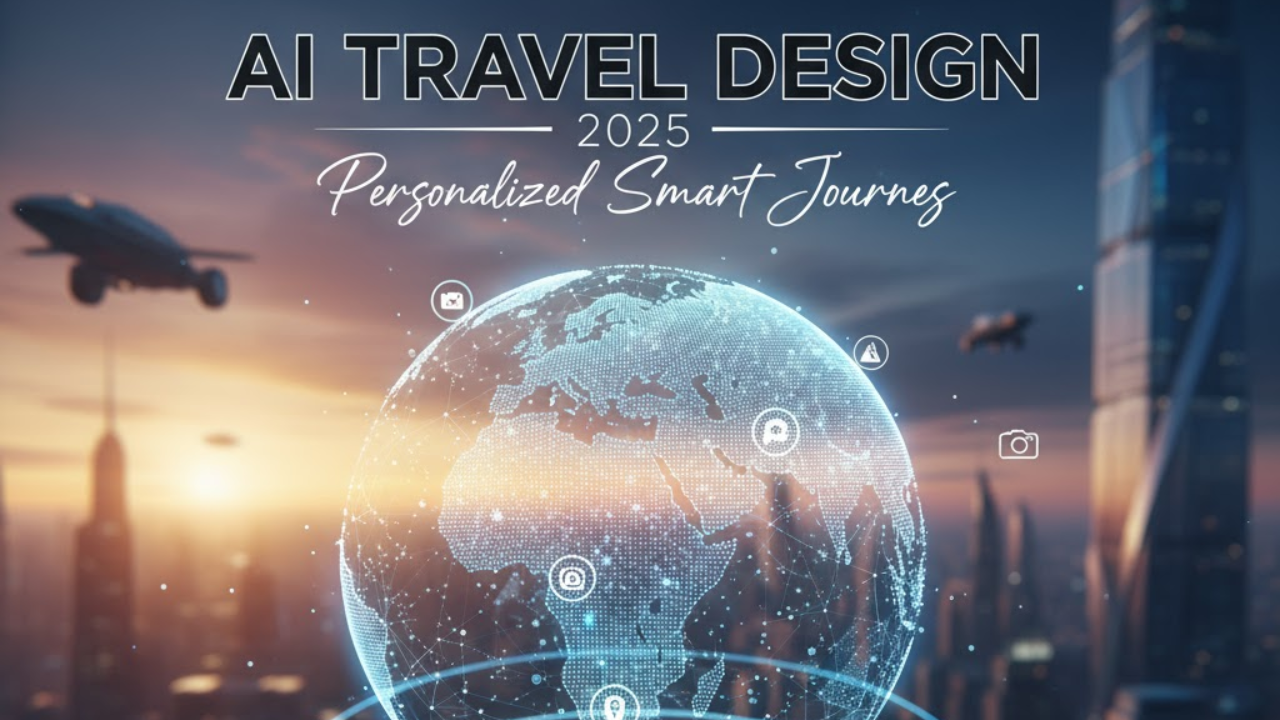You have not yet added any article to your bookmarks!

Join 10k+ people to get notified about new posts, news and tips.
Do not worry we don't spam!

Post by : Sameer Farouq
Travel in 2025 has entered its most personalized phase yet — one where AI knows you better than your travel agent ever could. Artificial Intelligence is reshaping how people explore the world, curating journeys that adapt to personal moods, interests, and even weather.
What once took hours of research is now a conversation away. From predicting ideal destinations to crafting real-time itineraries, AI travel design is making exploration smarter, faster, and deeply human at its core.
AI travel design refers to the use of artificial intelligence to analyze user data, preferences, and behavior to create customized travel experiences. It goes beyond automated booking — it understands emotion and intent.
For example, if you often search for peaceful escapes, your AI planner may suggest hidden lakeside retreats rather than busy cities. If it detects you’re stressed, it might recommend destinations known for wellness and rejuvenation. This isn’t just travel planning — it’s intuitive travel companionship.
Artificial intelligence now influences every stage of travel — from dreaming to discovery.
Trip Inspiration: AI tools like ChatGPT-powered assistants and travel bots create themed itineraries based on interests or stories.
Smart Booking: Algorithms compare prices across hundreds of platforms in seconds, finding the best value with transparent breakdowns.
In-Trip Assistance: Apps track flights, translate languages, and suggest nearby experiences dynamically.
Post-Trip Insights: Travelers receive analytics of their journey — how much they walked, spent, or reduced carbon footprint.
The result? A 360° digital co-pilot that transforms chaos into convenience.
The biggest shift AI brings is personalization. Instead of one-size-fits-all itineraries, AI travel design creates journeys as unique as fingerprints.
Using machine learning, it observes your travel history, social media activity, and even tone in conversation to predict what kind of trip will truly fulfill you. Whether that means adventure in Patagonia or solitude in Kyoto, your itinerary evolves with your personality.
AI transforms travel from transactional to emotional — guiding not just where you go, but why.
The concept of the AI travel companion is revolutionizing solo and family trips alike. Imagine having a smart assistant that not only suggests routes but narrates stories about places, finds restaurants suited to your diet, and tracks your safety in real time.
It also adapts as you go. If you cancel an activity, your digital companion instantly re-optimizes your day — offering new options nearby that match your interests and time. It’s like traveling with a guide who never sleeps and always knows what you’ll love next.
Unlike traditional algorithms, new-generation AI tools incorporate emotional intelligence. They detect how travelers feel — through text input, facial recognition, or biometric wearables — and modify suggestions accordingly.
Feeling anxious? AI might recommend a spa or quiet beach. Feeling adventurous? It could find an unplanned hike nearby. This emotional sensitivity ensures technology doesn’t replace human experience — it enhances it.
Travel is no longer just about logistics; it’s about understanding travelers as emotional beings.
AI isn’t just making travel easier; it’s making it more sustainable. Smart algorithms now analyze the environmental impact of trips, recommending low-carbon flights, eco-certified hotels, and local experiences that support communities.
Some systems even track your travel footprint, suggesting greener alternatives in real time. As sustainability becomes non-negotiable, AI helps travelers make ethical choices without extra effort. The era of responsible technology is here — where convenience meets conscience.
Travel agencies, airlines, and hospitality brands are reimagining their services around AI. Airlines are deploying predictive maintenance systems and smart pricing; hotels are using AI to tailor room settings to guest preferences; tour companies now run adaptive group experiences that evolve with participant moods.
For travelers, this means the end of stress-filled planning — and the rise of effortless personalization. The travel industry is no longer about destinations; it’s about data-driven delight.
Contrary to what many fear, AI doesn’t kill spontaneity — it refines it. By managing logistics in the background, AI frees travelers to focus on the moments that matter: a detour through a local market, an unplanned sunset stop, or a late-night conversation with strangers.
AI gives back what travelers lost in the digital age — the freedom to be fully present. It doesn’t dictate the journey; it designs the canvas on which you paint it.
Disclaimer: This article is for informational purposes only. AI travel tools should be used responsibly, with users verifying bookings, data privacy terms, and sustainability claims before finalizing any plans.










Sri Lanka Ex-Intel Chief Arrested Over Easter Attacks
Former SIS Chief Suresh Sallay arrested by CID in connection with the 2019 Easter Sunday bombings th

Japan Reports Spike in Measles Cases Authorities Issue Alert
Japan confirms 43 measles cases in early 2026, prompting health authorities to warn potential contac

Korea US Clash Over West Sea Drill Communication
Conflicting accounts emerge on prior notice briefing, and apology during Feb 18-19 US air exercise i

Richard Liu launches $690M eco-yacht brand Sea Expandary
JD.com founder Richard Liu invests $690M in Sea Expandary aiming to produce affordable green yachts

China imposes export curbs on 40 Japanese firms over military ties
Beijing restricts dual-use exports to Japanese companies, citing remilitarization concerns, promptin

Malaysia moves to protect Musang King durian amid China impostors
Authorities safeguard Malaysia’s Musang King brand as durians from Thailand and Vietnam are being fa